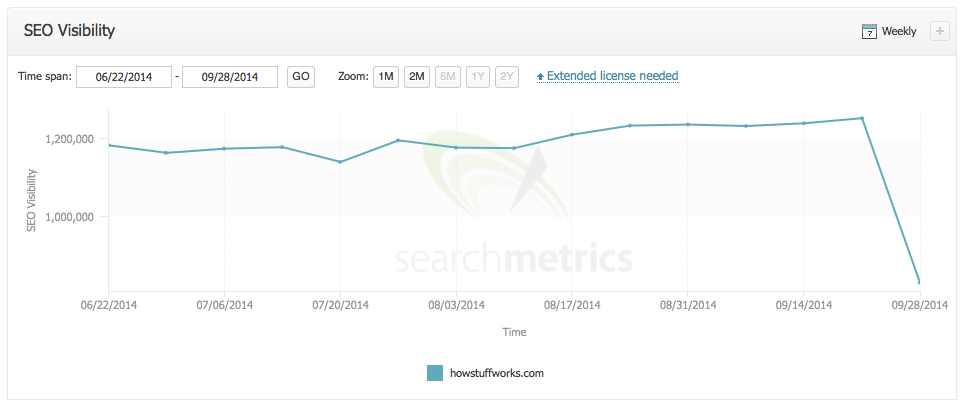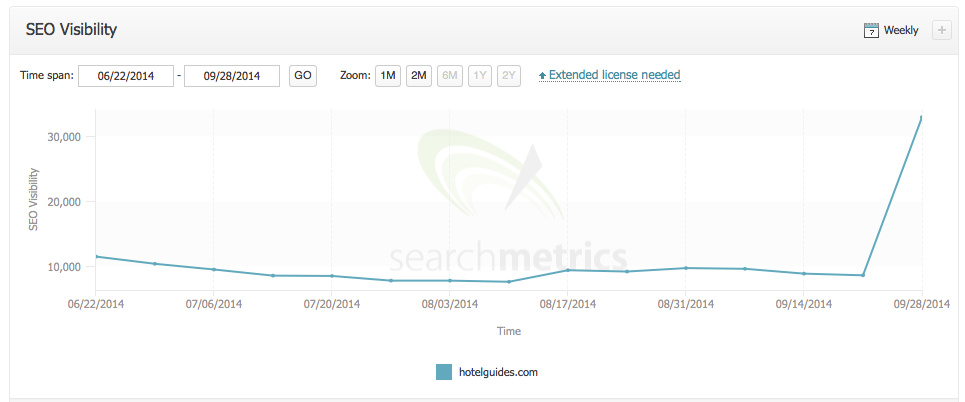Panda and your website visibility

For years I have been telling clients that website content is becoming increasingly important if they want their brand represented properly online. I’ll say it again: Content is king. These warnings are now beginning to play out in real time as Google tweaks its Panda algorithm to penalize sites that have thin content.
Google introduced its Panda update about four months ago, and many websites that had enjoyed high rankings fell off the edge of the world. Another update, version 4.1, last week caused additional pain for many additional sites, while rewarding those with rich content.
The Losers
According to data from Searchmetrics, a number of sites lost a staggering 40-70% of their visibility immediately after the release of Panda 4.1. These were primarily sites that contained minimal amounts of information on each page, such as straight listing sites. They may have had a lot of pages or a lot of stuff, but the content had little value: short sentences or links to other sites rather than actual information. Google is getting better at limiting the visibility of sites that offer up weak content, because sites like that aren’t especially useful to Google’s customers. Here’s an example of how the latest algorithm has affected one listing-type website:
Google wants to make web searches meaningful and useful.
When you type a search term into your browser, Google wants to display the sites that are most likely to deliver the answer you’re looking for. This is good for Google’s reputation as a search brand, and it’s good for your productivity. But to benefit from these changes means you have to generate quality content, and that’s not what SEO companies specialize in.
Many SEO specialists have been gaming the system through the use of quick, easy solutions like link farms and other techniques that take advantage of loopholes in Google’s algorithms to place sites higher than they normally would be.
For example, when it was discovered that Google rewarded properties with third-party sites linking to their content, thousands of link farms sprang up in a very short time that were nothing but links to the client sites of SEO firms to provide as many third-party links as possible. People were warned that these strategies would prove to be short lived, and they were. As Google works to plug holes, it also penalizes those sites that tried tactics like these to increase search placement. If your SEO specialist has been using black-hat strategies, you could find yourself dropped into the basement overnight with a very long road ahead of you as you try to dig yourself back out.
The Winners
On the other hand, sites that provide wide, rich content are increasingly coming out on top as these algorithms are improved. For example, review sites and information-rich corporate sites with white papers that you can read online (not just PDF files) are seeing huge gains. Here’s an example of one major winner from this week’s Panda update, a hotel review site with solid content:
How to win
The best strategy for high search engine placement over a long time period is to have strong, original content on your site. Post articles that help educate customers about your industry or specialty. Articles should be at least 300 words in length and not simply repeat something found elsewhere on the web. They need to be original and new content should be added frequently.
Have a blog that is updated at least once a month with meaningful content. Reviews are excellent. So are opinions. Tutorials are excellent, as is advice on any topic. News is useful, though it has little value as the content ages.
Link your content to “authority” sites like Wikipedia to maximize the value of your content. Such links, when done properly in relation to the link text itself, demonstrate that your content has real value and authority. This is what Google wants to reward.
Remember that time is your friend. As your content gets exposure, it can increase in value. If other people link to it in the right context, that becomes even more valuable. If that content is still there years later and still being sought out, it gains significant value because that proves to Google that you posted something timeless that people really want. Interaction through the use of community discussion is dynamite and can really help increase your results.
Video is also important. As new technologies allow video to be transcribed on the fly, those transcriptions add to your content value. Make sure the videos contain real content such as people talking about your products and services, and especially how they are solving problems and delivering answers.
Text on your site should be in natural language that’s easy to read. Don’t try to force keywords in an unnatural context because you can be sure that Google is going to be targeting these kind of things in the future. Answer questions and help people solve problems in the same kind of language you would use if they came into your office. That’s what will eventually put you on top.
These strategies don’t mean Search Engine Optimization has lost any importance. Not at all! There is a lot of value to having experts assist you in this area. Good SEO firms respect the changes being made by Google and sincerely look out for your best interests.
Your website content continues to be the key element in great SEO. Give me a call to discuss your needs. I’ll be happy to help you develop a powerful strategy and direct you to SEO partners that I trust.





No Comments